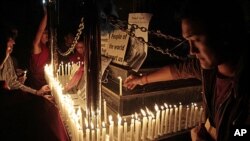After the suicide earlier this year of a young Tibetan Buddhist monk, who killed himself in protest at Beijing’s restrictions on religious freedom, two more monks face a "politically-motivated" trial in China Tuesday.
Tenchum and Tsering Tenzin are charged with "instigating and assisting" the death of Rigzin Phuntsog.
The 16-year-old monk died March 16 after setting fire to himself at Kirti monastery in China’s Sichuan province, close to the Tibetan border.
Kirti’s Tibetan Buddhist monks have staged several open protests defying Beijing’s authority since March 2008, when the worst anti-Chinese protests in a generation were violently suppressed across China’s ethnically Tibetan regions.
Robert Barnett, a Tibetan analyst at New York’s Columbia University, says these prosecutions are unusual, even in Tibetan areas, where a formal charge means an almost certain conviction.
"This looks like the situation that we are seeing that local officials or maybe central officials have decided to make these cases as an example to deter other Tibetans to protest," he said.
Tuesday’s trial follows that of the deceased’s uncle, Drongdru, a lama at the monastery. He was sentenced to 11 years in prison for intentional homicide after a day-long hearing Monday.
China’s official Xinhua news agency reports that Drongdru, 46, concealed his nephew for 11 hours after the suicide bid, preventing Phuntsog from accessing life-saving treatment.
Activists dispute this allegation, insisting that monks rescued Phuntsog from Chinese police, who began to assault him after extinguishing the fire.
"The trial is a clear escalation in terms of reprisals for cases of self-immolation [and] the first time we have heard of such an action by the government,” said Nicholas Bequelin, a senior researcher with Human Rights Watch.
In the past, most Tibetans involved in protests have been charged under state security laws. Tibet watchers say homicide charges mark a significant change in tactics by prosecutors that lead to longer prison sentences. Bequelin says this appears to be part of a broader effort by local officials to reign in the Kirti monastery.
"I think one of the objectives of this arrest is to break the spiritual back of Kirti, which has proven to be a very stubborn center of Tibetan identity and religiosity," he said. "Earlier this year, the government detained several hundred monks and disappeared them - essentially warehousing them in a government facility and carrying [out] political indoctrination."
At the time, Chinese officials said the monks needed to undergo “legal education” for disobeying Tibetan Buddhist rules and disrupting local order. Following protests from the United States and human rights groups over the detentions, Beijing officials called on critics to stop making "irresponsible remarks."
The trials follow a month of significant political change in Tibet affairs. Last week Beijing removed Zhang Qingli, the hardline Communist Party Secretary in Lhasa who ordered the 2008 crackdown.
Zhang’s successor, the former governor of Hebei province Chen Guoquan, vowed in his first speech in office “to resolutely carry on the Central Party’s instructions and policies regarding Tibet”.
Meanwhile the exiled Tibetan community elected Lobsang Sangay its new prime minister August 8.
"Of course, he has nowhere near the fame and respect that the Dalai Lama commands. Therefore it’s not clear how much political capital he can mobilize inside Tibet," said Bequelin.
The Harvard-educated lawyer is the first Tibetan leader to be born in exile, and is expected to assume many of the secular duties of the aging Dalai Lama. It is still unclear how China will ultimately react to the shifts in the Tibetan exile government.
Tibetan Monks Face Chinese Justice in Self-Immolation Case




